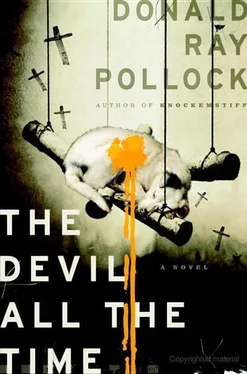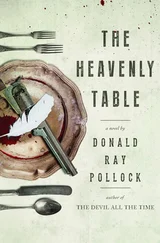AFTER TWO WEEKS IN THE HOSPITAL, Charlotte raised up in her bed and said to Willard, “I think I had a dream.”
“A good one?”
“Yeah,” she said. She reached out and squeezed his hand a little. She glanced over at the white cloth partition that separated her from the woman in the next bed, then lowered her voice. “I know it sounds crazy, but I want to go home and pretend we own the house for a while.”
“How you gonna do that?”
“With this stuff they got me on,” she said, “they could tell me I was the Queen of Sheba and I wouldn’t know any different. Besides, you heard what the doctor said. I sure as hell don’t want to spend what’s left of my time in this place.”
“Is that what the dream was about?”
She gave him a puzzled look. “What dream?” she said.
Two hours later, they were pulling out of the hospital parking lot. As they headed out Route 50 toward home, Willard stopped and bought her a milk shake, but she couldn’t keep it down. He carried her into the back bedroom and made her comfortable, then gave her some morphine. Her eyes glazed over and she went to sleep within a minute or so. “You stay here with your mother,” he told Arvin. “I’ll be back in a little bit.” He walked across the field, a cool breeze against his face. He knelt down at the prayer log and listened to the small, peaceful sounds of the evening woods. Several hours passed while he stared at the cross. He viewed their misfortune from every conceivable angle, searching for a solution, but always ended up with the same answer. As far as the doctors were concerned, Charlotte’s case was hopeless. They had given her five, maybe six weeks at the most. There were no other options left. It was up to him and God now.
By the time he returned to the house, it was turning dark. Charlotte was still sleeping and Arvin was sitting beside her bed in a straight-backed chair. He could tell the boy had been crying. “Did she ever wake up?” Willard asked, in a low voice.
“Yeah,” Arvin said, “but, Dad, why don’t she know who I am?”
“It’s just the medicine they got her on. She’s gonna be fine in a few days.”
The boy looked over at Charlotte. Just a couple of months ago, she was the prettiest woman he had ever seen, but most of the pretty was gone now. He wondered what she would look like by the time she got well.
“Maybe we better eat something,” Willard said.
He fixed egg sandwiches for him and Arvin, then heated up a can of broth for Charlotte. She threw it up, and Willard cleaned up the mess and held her in his arms, feeling her heart beat rapidly against him. He turned out the light and moved to the chair beside her bed. Sometime during the night he dozed off, but woke up in a sweat dreaming of Miller Jones, the way the man’s heart had kept on throbbing as he hung on those palm trees skinned alive. Willard held the alarm clock close to his face, saw that it was nearly four in the morning. He didn’t go back to sleep.
A few hours later, he poured all his whiskey out on the ground and went to the barn and got some tools: an ax, a rake, a scythe. He spent the rest of the day expanding the clearing around the prayer log, hacking away at the briers and smaller trees, raking the ground smooth. He began tearing boards off the barn the next day, had Arvin help him carry them to the prayer log. Working into the night, they erected eight more crosses around the clearing, all the same height as the original. “Them doctors can’t do your mom any good,” he told Arvin, as they made their way back to the house in the dark. “But I got hopes we can save her if we try hard enough.”
“Is she gonna die?” Arvin said.
Willard thought a second before he answered. “The Lord can do anything if you ask Him right.”
“How we do that?”
“I’ll start showing you first thing in the morning. It won’t be easy, but there ain’t no other choice.”
Willard took a leave of absence from work, told the foreman that his wife was sick, but that she’d soon be better. He and Arvin spent hours praying at the log every day. Every time they started across the field toward the woods, Willard explained again that their voices had to reach heaven, and that the only way that would happen was if they were absolutely sincere with their pleas. As Charlotte grew weaker, the prayers grew louder and began to carry down the hill and across the holler. The people of Knockemstiff woke up to the sound of their entreaties every morning and went to bed with them every night. Sometimes, when Charlotte was having a particularly bad spell, Willard accused his son of not wanting her to get better. He’d strike and kick the boy, and then later sink into remorse. Sometimes it seemed to Arvin as if his father apologized to him every day. After a while, he stopped paying attention and accepted the blows and harsh words and subsequent regrets as just part of the life they were living now. At night, they would go on praying until their voices gave out, then stumble back to the house and drink warm water from the well bucket on the kitchen counter and fall into bed exhausted. In the morning, they’d start all over again. Still, Charlotte grew thinner, closer to death. Whenever she came out of the morphine slumber, she begged Willard to stop this nonsense, just let her go in peace. But he wasn’t about to give up. If it required everything that was in him, then so be it. Any moment, he expected the spirit of God to come down and heal her; and as the second week of July came to an end, he could take a little comfort in the fact that she’d already lasted longer than the doctors had predicted.
It was the first week of August and Charlotte was out of her head most of the time now. While he was trying to cool her off with wet cloths one sweltering evening, it occurred to Willard that maybe something more was expected of him than just prayers and sincerity. The next afternoon he came back from the stockyards in town with a lamb in the bed of the pickup. It had a bad leg and cost only five dollars. Arvin jumped off the porch and ran out into the yard. “Can I give it a name?” he asked as his father brought the truck to a stop in front of the barn.
“Jesus Christ, this ain’t no goddamn pet,” Willard yelled. “Get in the house with your mother.” He backed the truck into the barn and got out and hurriedly tied the animal’s hind legs with a rope, then hoisted the lamb in the air upside down with a pulley attached to one of the wooden beams that supported the hayloft. He moved the truck a few feet forward. Then he lowered the terrified animal until its nose was a couple of feet from the ground. With a butcher knife, he slit its throat and caught the blood in a five-gallon feed bucket. He sat on a bale of straw and waited until the wound stopped dripping. Then he carried the bucket to the prayer log and carefully poured the sacrifice over it. That night, after Arvin went to bed, he hauled the furry carcass to the edge of the field and shoved it off into a ravine.
A couple of days later, Willard began picking up animals killed along the road: dogs, cats, raccoons, possums, groundhogs, deer. The corpses that were too stiff and too far gone to bleed out, he hung from the crosses and the tree limbs around the prayer log. The heat and humidity rotted them quickly. The stench made Arvin and him choke back vomit as they knelt and called out for the Savior’s mercy. Maggots dripped from the trees and crosses like squirming drops of white fat. The ground around the log stayed muddy with blood. The number of insects swarming around them multiplied every day. Both were covered with bites from the flies and mosquitoes and fleas. Despite it being August, Arvin took to wearing a long-sleeved flannel shirt and a pair of work gloves and a handkerchief over his face. Neither of them bathed anymore. They lived on lunch meat and crackers bought at Maude’s store. Willard’s eyes grew hard and wild, and it seemed to his son that his matted beard turned gray almost overnight.
Читать дальше












